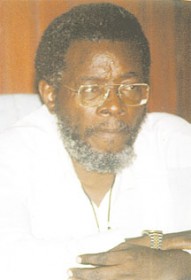Head of the Presidential Secretariat Dr Roger Luncheon says that his advertisement directive to the Guyana Elections Commis-sion (GECOM) has been misconstrued by “wicked people” but has promised to respond promptly to any formally documented concerns sent to him by the body.
“I will be happy to review whatever GECOM sends and I undertake to do it in a much more timely fashion than they have done with my correspondence,” Luncheon said yesterday during his post-cabinet press briefing at the Office of the President. He was at the time responding to a question regarding concerns raised by GECOM officials that a recent directive on advertising will affect the civic and voter education plans for next year’s election. OP has directed GECOM to submit its advertisements and notices for publication through the new government procurement website. GECOM, during a statutory meeting on Tuesday, decided to seek clarification from OP after some Commis-sioners admitted concerns about the implications of the directive as well as the financial control that government wields.
Luncheon, however, was dismissive of the recent developments and said that it was being caused by some “ill-informed, wicked people out there”. “I don’t believe that those who criticize are the only fountain of knowledge, he said. “I’ve been here 19 years I must know what can adequately be done in the name of voter education. I don’t need a lesson from [Steve] Surujbally or Kaieteur News. I know what could conceivably be unreasonable and I would be a madman, and the government would not encourage mad people to occupy my position and give instructions that are … counterproductive,” he said.

According to Luncheon, he wrote GECOM identifying “the content of public business of the commission that should be provided to the e-procurement website” adding that “he went further to identify what should be excluded.” Luncheon said that there was no way his instructions could be misconstrued.
“I don’t know where these guys are finding the time and encouraged by this media to engage in this spurious [and] useless activities; manufacturing sensational ideas. This is a non-issue,” he said.
Luncheon stated that the correspondence had been sent to GECOM weeks ago and he felt that the matter had been “consummated quite some time now”. He said that OP was in essence ensuring that there was coherence in that procurement had migrated to the e-procurement website.
Meanwhile, asked about the government’s failure to release money to GECOM to pay scrutineers, Luncheon said that the government had released money but highlighted concerns that Cabinet had about some of the Commis-sion’s procurement and accounting practices.
“I’m not aware that money has not been released. As a matter of fact, I am aware money has been released to pay GECOM’s scrutineers,” he said. “I would say this, the Budget Agency had brought to Cabinet’s attention a number of irregularities that…I suspect they have already been made known to the GECOM’s authorities and explanations are now being sought for the abandonment of the procurement rules and regulations,” Luncheon added. He said these lapses include incidents of sole sourcing and items being procured without the approval of the National Procurement and Tender Administration Board.
Luncheon, however, said that in 2009 and early this year, Cabinet authorized the release of funds to pay for services rendered as well as to pay the permanent staff and scrutineers. He suggested that it could have been the case where there was “an inadequate submission” for funds from GECOM and some persons may have “slipped through the cracks”.
Last Friday, the main opposition PNCR criticized the Ministry of Finance for the failure to pay scrutineers who had been appointed to ensure transparency in the running off of the ongoing continuous registration exercise. PNCR MP Lance Carberry, arguing that the ministry’s “dilatory performance” was creating problems for the smooth running of the continuous registration programme, questioned whether it was an attempt to create frustration and disaffection.




